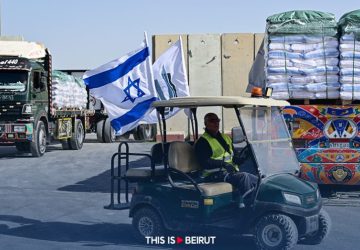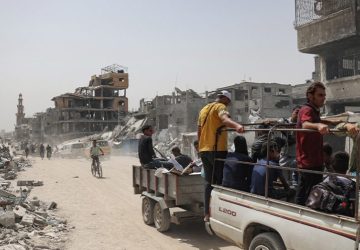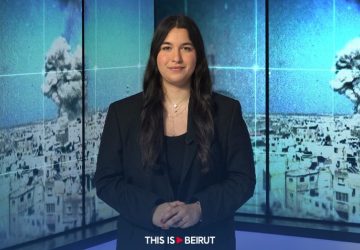Listen to the article
The race is on between diplomatic initiatives and the big explosion. Messages and mediation efforts between countries that intend to prevent a catastrophic war abound. Hezbollah is being advised to excercise caution and de-escalate to spare Lebanon total destruction, one that Hezbollah alone would bear responsibility for. Israel, in turn, is being pressured to thwart Netanyahu’s desire for further bloodletting – although nothing seems to have changed so far – and Israel’s allies are sending messages to Hezbollah to enforce a ceasefire before the end of the month, lest war be declared. Washington, too, wants a truce and a ceasefire before February, but the rising tensions with its long-time protégé, Tel Aviv, could turn this into an impossibility. So which side will be victorious?
According to Western mediators, Hezbollah seems ready to negotiate with the international community towards a ceasefire, provided that Israel commits to ending the war in Gaza, “after having entered the third stage with different resolutions, through the withdrawal of its ground troops from most of the Strip. So there is no point in keeping the southern front ablaze.” The same mediators stated that Hezbollah is willing to abide by a more general deal being prepared locally and regionally. Internally, according to the Shiite tandem, the pro-Iranian group wants a President that would guarantee its perennity and does not stab it in the back, a flexible head of State who would back Hezbollah’s strategy, safeguard its weapons, and refuse to sign international resolutions stemming from the Taif agreement that stipulates the use of arms to the State exclusively. Hezbollah wants a President whose election is the direct result of dialogue and consensus over a roadmap regarding points of contention, as per the message it conveyed to the special communication committee with Bkerke that convened in MP Farid Haykal al-Khazen’s home. Regionally, Hezbollah requires a cessation of all hostilities in Gaza, and Israel’s commitment to abide by the provisions of resolution 1701 and stop violating it.
As for the European Union, it proposed a solution to end the conflict in the region, following a procedural plan. It would begin with the declaration of an independent Palestinian State, the normalization of relations between Israel and the Arab world to ensure stability in the region, and the organization of a peace conference to be named Madrid 2, which would include all relevant parties internationally and regionally, and guarantee representation for Gaza and the West Bank. That being said, some officials accused Israel of giving birth to Hamas to eliminate all possibilities for a two-state solution, which made the Hebrew state withdraw from the initiative.
Certain Western diplomatic sources explained that, in anticipation of such changes, the Madrid 2 peace conference must be held in the region. This, however, would require the election of a President in Lebanon and the formation of a government that would enable the country to enter negotiations with a unified stance. For that reason, the Group of Five was mobilized to work jointly with the European Union, when it became apparent that the third stage would begin at the end of the month, bringing with it important changes – with regard to a solution and a settlement – in Gaza and South Lebanon.
In this context, sources close to Dahyeh from the March 8 movement stated that “Hezbollah does not oppose the election of a President but wants a head of State on its own terms. The need for Hezbollah to have a President elected is directly linked to its ‘falling out’ with the Free Patriotic Movement (FPM), its former ally.” This is why Hezbollah is now endeavoring to replace this alliance with a Sunni-Shia tandem joining forces with the Marada movement. Druze leader Walid Jumblatt was not out of the equation either, considering his recent statements about his support for the candidacy of Sleiman Frangieh. The acceleration of the political alliance process denotes an international will to facilitate the presidential election through communications aimed at choosing a candidate suitable for everyone, hence the mobilization of the Group of Five. As for Bkerke, it called for successive electoral sessions to elect a President in conformity with the constitution.
In the eyes of Bkerke and the opposition, the presidential election does not require dialogue, agreement or consensus. According to them, “dialogue necessitates participation from divergent sides, and should one of these sides refuse to partake, they would be excluded from the process.” That is why one of the opposition leaders stated that there would be no dialogue, “because in previous cases, the initiatives have failed, starting with the 2006 dialogue session led by Parliament Speaker Nabih Berri. All decisions – voted unanimously – remained unimplemented, notably the disarmament of Palestinians outside the camps. That, and the decisions taken by the national dialogue committee under President Michel Sleiman, including the Baabda Declaration which Hezbollah, the FPM and the March 8 representatives rejected. The same bloc also refused the defense strategy put in place by President Sleiman.”
Both Bkerke and the opposition believe that dialogue, agreement and consensus over a President would weaken the head of State and limit their prerogatives, as the President would become the hostage of the political agreement that led them to Baabda. Therefore, opting out of the consensus would generate a possible war and threaten national unity. An opposition deputy admitted that Hezbollah, indeed, has a say in choosing a President, but its candidate will not succeed. Despite positive information shared by sources close to Hezbollah, some political milieux indicated that the future of Hezbollah’s candidate will not be decided before a solution is found in Gaza. As for the mobilization of the Group of Five, it is aimed at holding a meeting to set a roadmap for the solution. That is the reason why the Fench envoy to Lebanon, Jean-Yves Ledrian, acted ahead of the meeting and began negotiations in Riyadh and Doha, to be resumed in Beirut next February. Ledrian will then communicate the unified stance of the Group of Five, which is why Berri stated, “We will have a President soon.”
Further highlighting the presidential election topic is the contact established between France, Saudia Arabia and Qatar, with Iran, to facilitate the election in question; Tehran’s role in that context is not be neglected, as it operates through Hezbollah. And European officials, through their communication with the pro-Iranian group, are focusing on ending the war in the South and keeping the fronts from expanding, in order to transition towards the election of a President as the only way to find a solution and reach a settlement. In fact, peace in the South will undeniably have a positive impact on the conflict in Gaza, given that Israel proceeded to withdraw a large number of its troops, in preparation for stage 3 – which consists of a ceasefire and the liberation of hostages and detainees to start negotiations, find a solution and reach an agreement on the regional level.





